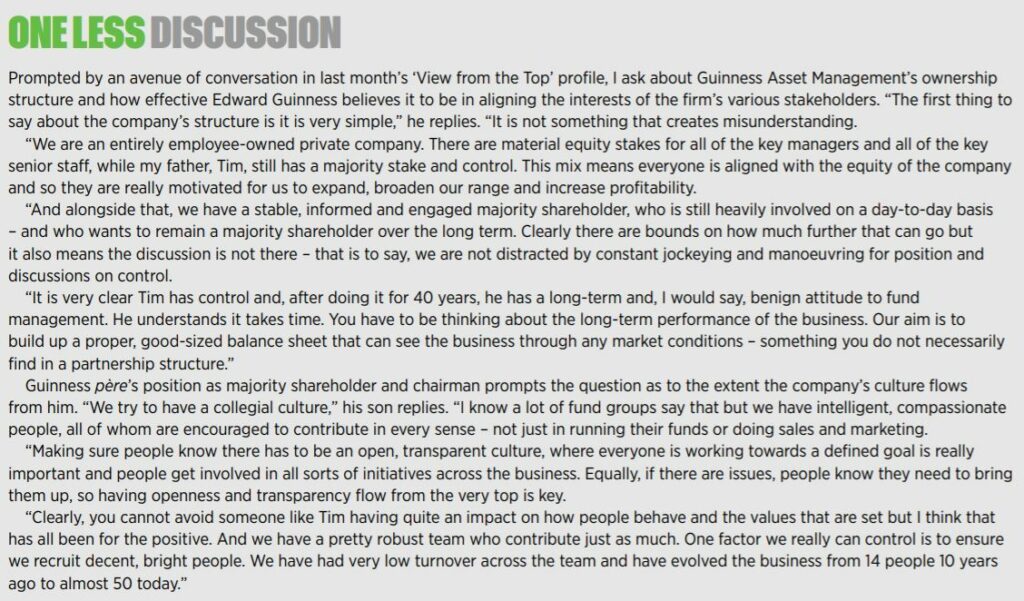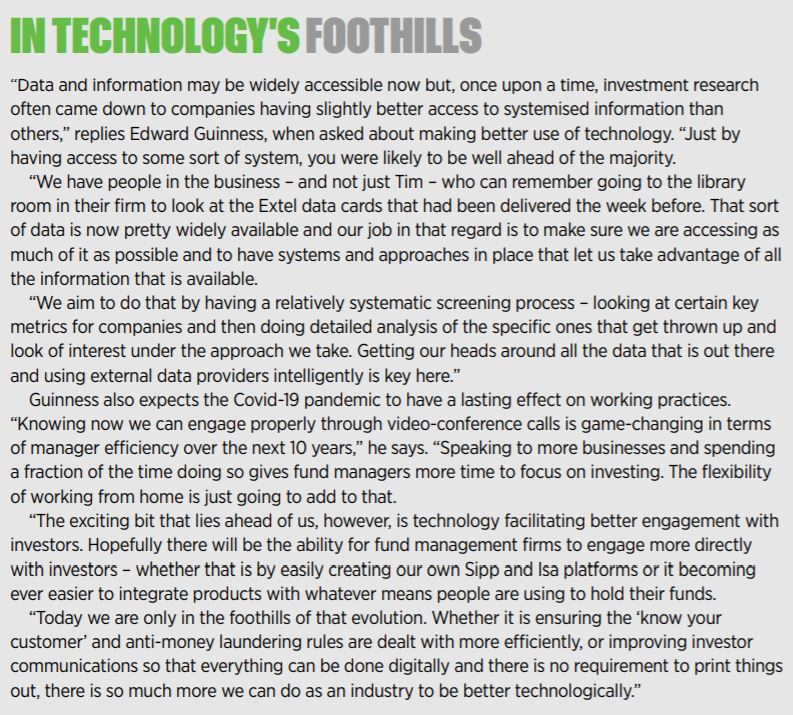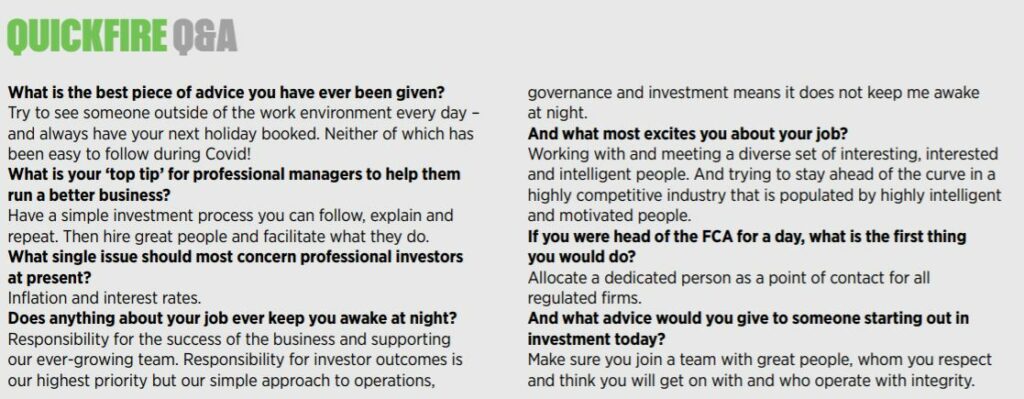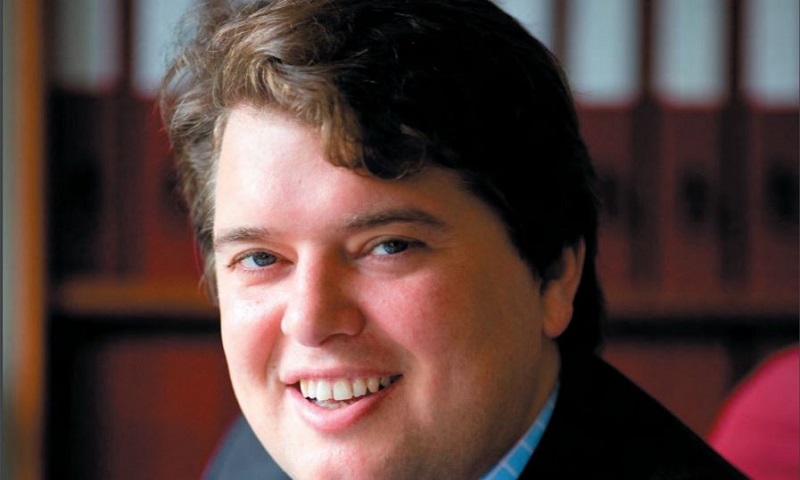‘Stick to what you know best’ is a pretty sound maxim for investors – and what Guinness Asset Management’s founders knew best when they set up the firm in 2003 was running Asian funds, energy funds and innovation funds. “It might seem a bit naïve now,” reflects Edward Guinness, who joined the business in 2006 as a fund manager and became CEO in late 2019, “but, at the time, those three areas were deemed to be uncorrelated.”
From those original three specialisms, the company’s somewhat eclectic stable of strategies has emerged through evolution as much as design. “What we have looked to do is build up competencies in areas where we have good knowledge and where our process will add value,” says Guinness. “Take our Global Equity Income Fund, for example, which came about directly as a result of the financial crisis of 2008/09.
“From that experience, we decided we needed a product that would not only perform well through all sorts of market conditions – through financial crises as well as through the good times – but also deliver what investors really want, which is income. We believed this would become increasingly important – and that view has been borne out over the past 10 years.”
Out of that global fund has sprung a number of regional strategies. “We have an Asian equity income fund that is now beyond critical mass and has an increasingly good performance track record,” says Guinness. “And we have European, emerging markets and UK equity income funds, with all of which we are gently building their track records to the point where we can go out and market them.”
Guinness AM’s sustainable investment offerings have similarly methodical origins that, somewhat counterintuitively, spring from its roots in the not-always environmentally friendly world of energy and oil. In the late 1980s, Ed’s father Tim – the company’s founder and current chairman – had co-founded Guinness Flight Global Asset Management, which was eventually sold to Investec Bank in 1998.
Lasting legacies
In 2003, Investec appointed Guinness AM as the outsourced investment manager of Investec Global Energy and, over the next five years – something of a golden era for commodities investing – the fund’s assets surged from next to nothing to in excess of $2bn (£1.56bn). This success had some notable and lasting legacies for Guinness AM, one of which related to personnel.
“It enabled us to hire a really strong team and then, through 2006, 2007 and 2008, we used that team to build out and manage new products,” says Guinness. “A decade or so later, we are now at the point where we are training up and trying to give greater responsibility to the more junior members of the team, so we have people who understand how we like to do things for our next generation of products.”
A further legacy of the Global Energy mandate was the aforementioned move into sustainable investing. “The fund had begun investing in companies such as Spanish wind-turbine manufacturer Gamesa,” explains Guinness. “Such businesses were within the fund’s universe but Tim, who was running it at the time, had seen they moved to the beat of a very different drum to conventional energy stocks.
“We thought a more exciting opportunity existed to launch a separate product completely focused on an area that would, at some stage, have its time. Everybody is very excited about sustainable investing right now but it has not always been easy as a sector. Our experience of having invested in this area for as long as we have means we are thinking through the economic cycles that come even with a high-growth sector.”
In turn, pioneering sustainable energy investment led Guinness AM to Enterprise Investment Schemes (EISs). “There was a period where you could do small company investing into renewables projects in the UK, which we thought would be great for investors,” says Guinness. “We pursued that and it has now evolved into a growth business. Again, we created a beachhead and then saw where the opportunities set lay.”

Latest ‘beachhead’
The company’s latest such ‘beachhead’ is in the multi-asset space where it is forging a partnership with Brewin Dolphin. “We had been talking about wanting to get closer to our end-customer and multi-assets can help you do that,” says Guinness. “In Brewin, we have managed to find a really good partner – offering their model portfolio service in a unitised product, which has now attracted north of $100m in a couple of years.”
Having seen more than its fair share of mergers and acquisition in the late 20th and early 21st centuries, Guinness AM appears keen to stay clear of such activity these days. “We are very cautious on M&A as a way to add value,” says Guinness. “Partly that ties into the cultural differences of suddenly putting together teams who are used to doing things their own way. That can be very challenging.”
One aspect of the company’s pre-history Guinness would very much like to recreate, on the other hand, is a much closer relationship with retail investors – though he argues some of the ingredients for such an outcome lie beyond his control. “As an asset manager, you are wrestling with increasing disintermediation – certainly with regard to the retail sector,” he begins.
“As everyone knows, this has only been getting worse – though not necessarily, I would say, from the investor’s perspective – and the reason the platforms have been able to gain such a strong foothold within asset management is because the administration involved in investing in funds is so fiddly. I invest through a platform myself so I completely understand the pain.
“Look back to Guinness Flight, though, and we do have a history of a good retail following and we would like to do more of that now. We already have a good retail following in the US with our sister business, Guinness Atkinson, and while a lot of the investors in our EIS business come to us via financial advisers, you at least do know the names and addresses of, and have a relationship with, individual investors.
Informed and intelligent
“At Guinness AM, our big success has been with the high-end discretionary wealth market – from top-end IFAs and discretionary wealth managers to private banks and multi-asset and multi-manager funds. Here we are dealing with informed, intelligent fund selectors, with whom we are able to engage really well. We do have a small direct retail book but most such investors come through the platforms.”
Much of the cause of that, Guinness suggests, boils down to regulatory requirements, which “makes it hard for us to do something slick and efficient” – though he is quick to stress that does not amount to a criticism of the regulator itself. “The intentions of the regulator are completely right and we are very supportive of what it is trying to achieve,” he continues.
“Looking after investors is, first and foremost, what we think about every day and that is also what the regulator is trying to make happen. Where frustrations can come, however, is with the language used in the regulatory environment. If you are a small firm like ours, it devolves to the senior team to interpret rules that are quite often being guided by the very large firms and, especially, by their compliance and legal departments.
“As a result, they do not always translate easily into everyday action, which means smaller firms can spend a lot of time wrestling with the words of the legislation – though, almost invariably, we do get through that to a point that works better for the investor. A further frustration stems from our offering what we believe to be simple, well-constructed funds where the risk is managed both structurally and by the skill of the fund managers.
“Furthermore, we have external custodians and independent fund administrators and accountants and, since we run equally weighted 30-stock portfolios, we do not have heavy concentrations in specific stocks. As a result, many of the regulator’s concerns are addressed in the way we set things up on day one – and yet often we find ourselves still having to jump through a lot of extra hoops.

Good intentions
“I mentioned the difficulty individual investors can have coming into funds and a lot of that is down to the ‘know your customer’ and money-laundering requirements. Clearly nobody could argue against the good intentions of such measures – they are really important – but the details of requiring utility bills, say, and the number of chase-up documents people have to go through simply to open an account are definitely a handicap.”
In addition to finding ways to be closer to end-investors, Guinness AM harbours ambitions to become a more global business. “The UK makes up around 35% to 40% of our overall investors, which means we already have a really good non-UK investorbase,” says Guinness. “We have good presence across Europe and Guinness Atkinson gives us a toehold in the US.
“At the same time we are starting to make progress in Asia and we also have investors in South Africa and Australia. So moving our focus from one small but very important corner of the globe to becoming an investment management provider to the whole world – that is what we hope to see happening for the business over the next 10 years.”
And how does Guinness see the asset management sector as a whole developing over a similar timeframe? “Already there is a bit of a bifurcation in the industry where, on one side, you have some very large players with large numbers of funds,” he replies. “These companies may have an entrenched position today but it is becoming increasingly hard for them to differentiate themselves.
“As a result, I believe we will see a steady rise in ‘large boutiques’, let’s call them, that are differentiated in their approach and their people and have 10 or 12 key products they are out there actively engaging with investors on. You are already seeing signs of that with the success of smaller firms coming through – the likes of Liontrust and Jupiter. We aspire to be part of that.”

This article first appeared in the April 2021 issue of Portfolio Adviser. Read more here.










